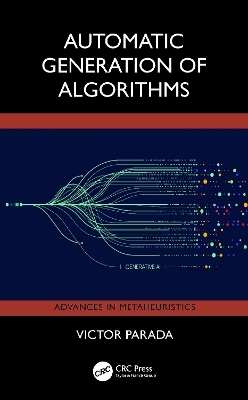
Automatic Generation Of Algorithms
CRC Press (Verlag)
978-1-032-89445-4 (ISBN)
- Lieferbar (Termin unbekannt)
- Versandkostenfrei
- Auch auf Rechnung
- Artikel merken
practical applications, and future directions.At its core, this book is an invitation to reimagine the boundaries of algorithmic design. It is crafted for researchers, practitioners, and enthusiasts in computer science, operations research, AI, and beyond.
In the rapidly evolving domain of computational problem-solving, this book delves into the cutting-edge Automatic Generation of Algorithms (AGA) paradigm, a groundbreaking approach poised to redefine algorithm design for optimization problems. Spanning combinatorial optimization, machine learning, genetic programming, and beyond, it investigates AGA's transformative capabilities across diverse application areas. The book initiates by introducing fundamental combinatorial optimization concepts and NPhardness significance, laying the foundation for understanding AGA's necessity and potential. It then scrutinizes the pivotal Master Problem concept in AGA and the art of modeling for algorithm generation. The exploration progresses with integrating genetic programming and synergizing AGA with evolutionary computing. Subsequent chapters
delve into the AGA-machine learning intersection, highlighting their shared optimization foundation while contrasting divergent objectives. The automatic generation of metaheuristics is examined, aiming to develop versatile algorithmic frameworks adaptable to various optimization problems. Furthermore, the book explores applying reinforcement learning techniques to automatic algorithm generation. Throughout, it invites readers to reimagine algorithmic design boundaries, offering insights into AGA's conceptual underpinnings, practical applications, and future directions, serving as an invitation for researchers, practitioners, and enthusiasts in computer science, operations research, artificial intelligence, and beyond to embark on a journey toward computational excellence where algorithms are born, evolved, and adapted to meet ever-changing real-world problem landscapes.
Victor Parada is Titular Professor in the Informatics Engineering Department at the University of Santiago, Chile
1. Overview of Optimization
1.1 Introduction
1.2 Combinatorial Optimization
1.3 NP-hardness
1.4 NP-hardness in Combinatorial Optimization
1.5 General Framework of a Combinatorial Optimization Problem
1.6 Methods for Combinatorial Optimization Problems
1.7 A General Optimization Algorithm
1.8 Summary
2. The Master Problem
2.1 Introduction
2.2 The Problem Statement
2.3 The Space of Instances
2.4 The Space of Algorithms
2.5 The Space of Parameters
2.6 Simultaneous Parameter Optimization with AGA
2.7 Independent Parameter Optimization
2.8 The Algorithm Selection Problem
2.9 The No-Free-Lunch in AGA
2.10 Summary
3. Modeling Problems
3.1 The Modeling Process
3.2 Identifying Problems
3.3 Approaching Practical Problems in Operations Research
3.4 Fundamental Models in OR
3.5 Approaching Practical Problems via AI
3.6 Fundamental Models in AI
3.7 Approaching Practical Problems by AGA
3.8 A Fundamental AGA Model
3.9 Summary
4. AGA with Genetic Programming
4.1 Introduction
4.2 The Master Problem in AGA
4.3 Genetic Programming
4.3.1 The General Algorithmic Evolutionary Process
4.3.2 Genetic Operations in GP
4.4 GP as a Metaheuristic
4.5 Modeling the Master Problem with GP
4.5.1 Solution Representation as a Tree
4.5.2 The Fitness Function
4.6 The Evolution of Algorithms
4.7 Constructive and Refinement Algorithms
4.8 Robustness Versus Specialization
4.9 AGA for Population-Based Algorithms
4.10 Rediscovering Algorithms
4.11 AGA Specification Sheet
4.12 Summary
5. AGA and Machine Learning
5.1 Introduction
5.2 Schematic Overview of Machine Learning
5.2.1 Modeling a Practical Problem
5.2.2 Meaning of the Dataset
5.2.3 Hypothetical Model
5.2.4 The Optimization Problem
5.2.5 Algorithms for the Optimization Problem
5.3 Types of Problems in Machine Learning
5.4 Schematic Overview of the Automatic Generation of Algorithms
5.4.1 Problem Instances
5.4.2 Algorithmic Components
5.4.3 The Master Problem
5.4.4 The Resulting Algorithm
5.5 Symbolic Regression
5.6 Summary
6. Producing Metaheuristics Automatically
6.1 Metaheuristics and AGA
6.2 Types of Metaheuristics
6.3 Key Concepts in Metaheuristics
6.4 Solution Container Definition
6.5 Terminals Definition
6.6 Defining Terminals for AGM
6.7 Possible Combinations
6.8 Summary
7. AGA with Reinforcement Learning
7.1 Introduction
7.2 Dynamic Programming
7.3 Bellman's Principle of Optimality
7.4 Dynamic Programming Algorithms
7.5 Dynamic Programming Approaches
7.6 Deciding Agent Problem
7.7 AGA with Reinforcement Learning
7.7.1 Introduction
7.7.2 RL Algorithms
7.7.3 Modeling the Automatic Generation of Algorithms as a DAP
7.8 Summary
8.Conclusions and Future Trends
8.1 Introduction
8.2 Future Directions and Research Paths
8.3 Closing Thoughts
| Erscheinungsdatum | 24.12.2024 |
|---|---|
| Reihe/Serie | Advances in Metaheuristics |
| Zusatzinfo | 12 Line drawings, black and white; 1 Halftones, black and white; 13 Illustrations, black and white |
| Verlagsort | London |
| Sprache | englisch |
| Maße | 156 x 234 mm |
| Themenwelt | Informatik ► Theorie / Studium ► Künstliche Intelligenz / Robotik |
| Mathematik / Informatik ► Mathematik ► Angewandte Mathematik | |
| Mathematik / Informatik ► Mathematik ► Finanz- / Wirtschaftsmathematik | |
| Technik ► Elektrotechnik / Energietechnik | |
| ISBN-10 | 1-032-89445-8 / 1032894458 |
| ISBN-13 | 978-1-032-89445-4 / 9781032894454 |
| Zustand | Neuware |
| Informationen gemäß Produktsicherheitsverordnung (GPSR) | |
| Haben Sie eine Frage zum Produkt? |
aus dem Bereich


